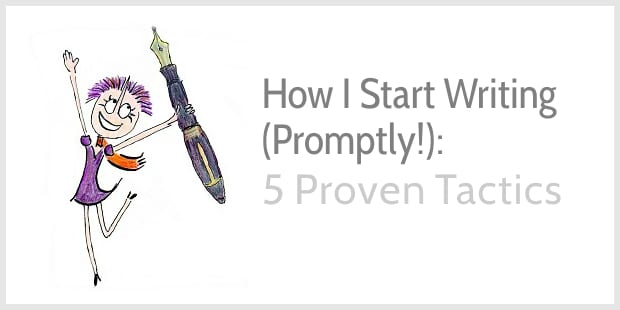 I used to be a champion procrastinator.
I used to be a champion procrastinator.
I wanted to write. I loved writing.
But still …
I’d do anything to delay writing.
Until a deadline came close.
And then adrenaline would fuel a writing session, often late at night.
It was stressful, and I hated myself for all the delays. Why was I wasting so much time?
Some people say: Just put your bum on a seat and write. Just summon your willpower.
If only life was that simple!
It didn’t work for me.
Yet, over the years, step by step, I’ve found hope.
I made peace with my inner critic, and I discovered several tactics that help me start writing more promptly.
I became more productive, and writing has become less stressful, more joyful.
Want to know more?
1. Build a bridge to tomorrow
I built bridges in two ways.
First, I avoid writing until I’m empty.
When I have some enthusiasm left in my tank, it’s easier to start writing the next day.
Because enthusiasm carries momentum forward.
Next, I know how to continue the next day. I may have an outline for writing a first draft. Or I have a first draft I want to revise.
Or, when I’m working on a bigger project, I know what the next section should contain.
As Hemingway said:
The best way is always to stop when you are going good and when you know what will happen next.

And when I start a new article?
I always pick an idea one or more days before I plan to write a first draft. During a walk, I mull that idea over in my mind. Then, I let it go.
Building bridges boosts productivity because our brains continue processing and consolidating ideas, even when we don’t focus on those ideas. This is called diffuse-mode thinking, and the ultimate opportunity for diffuse-mode thinking is sleep.
So, after I sleep on an idea, I often wake up knowing what to include in an article and how to structure it. Having such a starting point makes a big difference …
The blank page feels less intimidating, and I feel eager to start writing. Such joy.
Walking and sleeping are my favorite productivity tools.
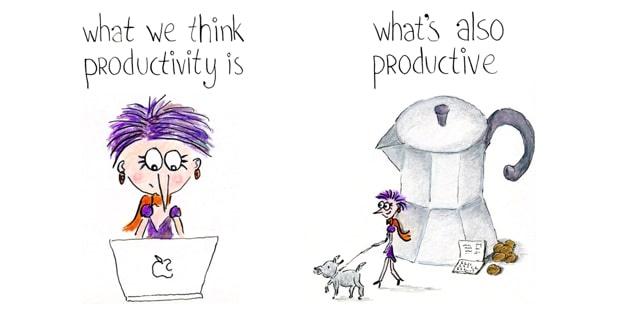
2. Forget big, hairy goals
Want to write a book or course?
Or would you like to start a regular newsletter or popular blog?
Fab!
Set your goal, and then forget about it.
Instead, focus relentlessly on the task at hand.
I’ve never really thought about writing a regular blog. I’ve never visualized success. I laugh at the idea of leaving a legacy.
I just wrote my first blog post in November 2012, and then started the next.
And now, somehow, very quietly, there’s a body of work here for anyone to enjoy and improve their writing skills. It arrived sentence by sentence, blog post by blog post.
Whether I’m writing a book, a course, or one blog post, I take it one step at a time.
I focus on the work in front of me.
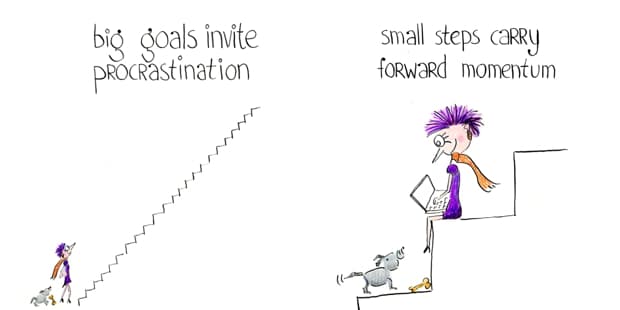
3. Make writing a choice
Does writing feel like a chore?
Like most people I don’t like doing chores.
And when I tell myself I SHOULD do something, my resistance to doing it grows.
There’s a surprisingly simple solution:
Stop telling yourself you SHOULD write. Instead, make writing a choice. Rub your hands together, and tell yourself:
- Today, I want to write.
- I feel lucky I can write today.
- I choose to start my day with writing.

The more I’ve moved away from SHOULDs, the more joyful writing has become and the keener I am to write.
Writing has become my favorite activity of the day, and I’ve even learned to embrace the challenges and messiness of writing.
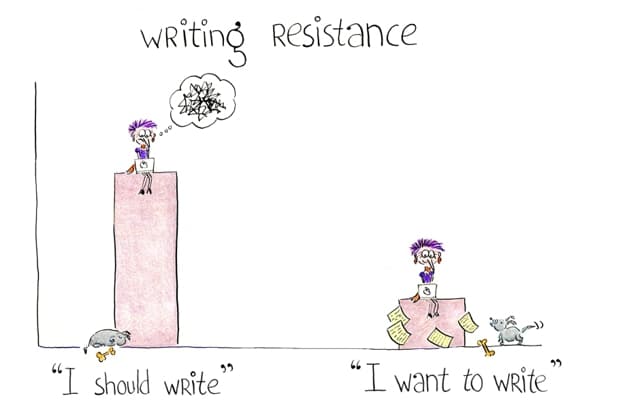
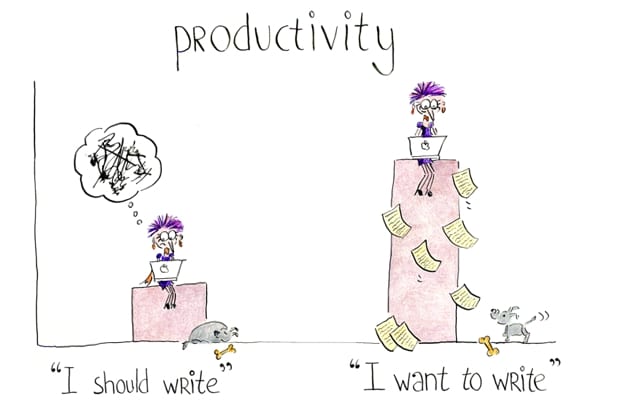
4. Create a ritual
You’ve probably heard of pre-game rituals in sports.
The athlete who listens to a rap song before each game. The tennis player who bounces the ball 11 times before each service. A runner wearing their lucky underpants.
Some say these rituals are superstitious. But they serve a real purpose: To trigger a state of intense focus so athletes can perform at the top of their game.
Research in sports psychology suggests rituals boost confidence and improve motivation. When you feel anxious, a ritual can also calm you down so you can focus on your next task.
A ritual can be fairly simple:
- Pour coffee into your favorite writer’s mug, close the door, and start writing.
- Put your headphones on, start your favorite playlist, and start writing.
- Wrap your favorite orange scarf around your neck, brew a cup of tea, set a timer, and start writing.

I used to think that I had to feel inspired to write.
But I’ve learned that’s the wrong way around.
Motivation and inspiration often follow action.
So, I switch on my computer; I brew a cup of peppermint tea; I set my timer; and my brain jumps into writing mode.
A ritual on its own doesn’t work for me. It works best if I’ve built a bridge (I know what to work on) and if I choose to write (no SHOULDs!).
Even when I feel demotivated, I know that deep down, I want to write because when I write I feel most alive. I just have to get going.
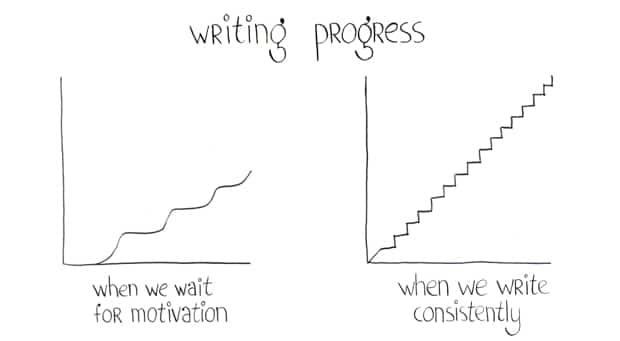
5. Acknowledge your fears
I used to fight my inner critic.
Until I didn’t have the energy to fight anymore.
Now, when my inner critic tries to block my writing intentions, I acknowledge what she’s telling me. I acknowledge that she’s afraid that I might fail or get criticized.
Next, I pay attention to the reaction in my body. Where’s the tension? Do I feel a knot in my stomach? Is a headache coming up?
When I acknowledge my fears and observe the reaction in my body, my inner critic starts quietening down. Instead of using my energy to fight her, I now use my energy to write.
I know what I want to write matters to me, so I get to work.
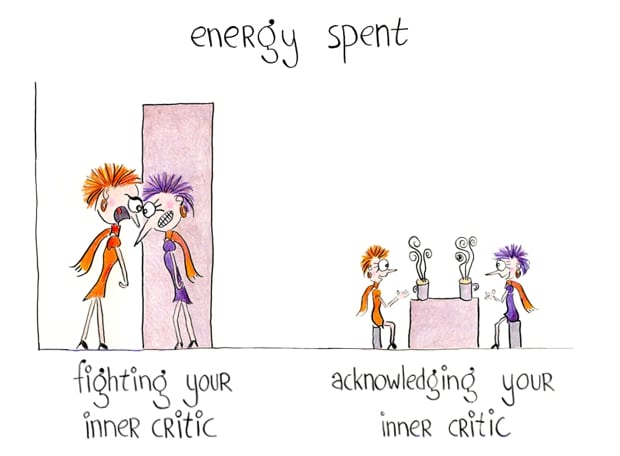
Today I feel lucky to write
I can’t tell you writing is easy.
Writing is challenging. It can be hard. It can be messy.
But writing also helps me connect with myself.
It teaches me to formulate my thoughts, and it shows me what matters to me.
So, I accept any discomfort.
And I feel lucky to write.
Happy writing, my friend!


Thanks. I just started writing this comment by using your tips. 😜
Very smart! 👍
“Today I feel lucky to write. Today I feel lucky to write. Today I feel lucky to write.”
Wow, that line gave me chills. I think I just found my new self-cheerleading chant. I wrote it on a Post-It.
As a self-employed writer, I used to struggle with discipline (I still do!).
I find that prepping the outline or ideas a few days ahead really helps. It’s a total mental shift to not have to start with a blank page.
Pomodoro timers don’t really work for me. Or writing in a coworking space (too many distractions!). But I discovered Focus Mate (virtual co-working), and it boosted my productivity.
Thank you so much for writing this post. Excellent insights, as always. And I so love the Bialetti (mine is the Kitty variant) and the ‘walking the dog’ illustrations — can totally relate; these two things make my day.
What a lovely comment. Thank you, Jenny.
I think we all just have to experiment and find out what works for us. Switching on Focus Mate sounds like a good ritual, too.
Happy writing!
Excellent – and boy did I need this. TY!! Always such outstanding insight and counsel. And such fun illustrations!
Thank you for your lovely compliment, Pamela. I’m delighted you enjoyed the illustrations (as well as the article). 🙂
I really love this article. I really needed to hear this words now… Thanks ma’am
I hope it helps to know that you’re not alone. So many of us struggle to start writing, even if we desperately want to write. I hope the tactics mentioned here help.
Always such encouraging advice Henneke. Thank you for being so open and honest.
Thank you, Michelle. Happy writing!
I, for one, am very thankful that you want to write these blogs posts.
Because I want to read them.
One of the best stokes of luck the universe has ever sent my way.
This post is spooky in that I was just wondering the other day what you thought of Hemingway’s concept of stopping the day’s journey with some gas left in the tank.
Now we know.
Next super important question. That’s the 6-cup Bialetti stovetop expresso maker, not the 3-cup, in the illustration, right?
Thanks again for being you and sharing this. I’m sure I’ll refer back to it again and again.
A definite reread.
I hope this message finds you well.
It’s a big YES from me on stopping with some gas left in the tank. It makes a surprisingly big difference. I was thinking about writing a dedicated post about it some time.
On the drawing: I can’t remember. I’m sorry! I made this drawing a few years ago. I googled to find an image of a percolator because I think of diffuse-mode thinking as percolation time. I used a more or less random image as a reference for the drawing. Somehow, it turned out a little wonky, and I remember being a bit upset about the wonkiness. I don’t know much about percolators. I don’t even drink coffee.
I enjoyed “How to Read Nature.” Thanks so much again for the recommendation. My favorite sentence was the one you quoted: “I love the way bakers pull a sponge cake from the oven and then lower an ear to the browning surface of the mixture to listen for gas escaping, or the old-timer mechanics who can identify the spark plug that needs changing by cocking one ear.”
“I have learned that what I have not drawn I have never really seen, and that when I start drawing an ordinary thing, I realize how extraordinary it is, sheer miracle.”-Frederick Franck, -“The Zen of Seeing”
I’m gonna call it a 6-cup Bialetti, whatever, not wonky.
It works.
I could add more to this reply about this great post but I’m going to leave some expresso (human rocket fuel instead of gas) in the tank.
Thanks again for the inspiration.
Yes, let’s call it a 6-cup Bialetti. That’s what I’ll call it from now on, too. Thank you!
And another wonderful quote, and more to read. I’m grateful 🙂
A few days ago, I was almost pulling my hair out. I had to complete an assignment for Karakter en Dialoog by Kitty. You know who she is 😉 I absolutely despised trying to come up with a suitable topic. However, your blog provided exactly what I needed. Yesterday, I reviewed the assignment scheduled for today and brainstormed some ideas. Tomorrow morning, I will submit it. I am going to write with confidence. Thank you!
Fabulous! Thanks so much for sharing, Elmke. Isn’t it amazing how resistance can disappear? Happy writing!
I have to remember that I choose writing because it makes me happy. And over the years, it’s become my source of income. Sleeping also does a lot of wonders. And standing in the shower (I’m not really a walker because I don’t like going out so much, lol). And I’m sipping my peppermint tea while reading this. Thanks for these tips!
Oh, yes, standing in the shower is one of my favorites, too, and another excellent place for getting new ideas. I just brewed another cup of peppermint tea, too. Like drinking tea with you 🙂
Thank YOU Henneke for sharing!!!
😘
Thank you, Valentino. Happy writing!
Dear Henneke,
your tips are so helpful not only to jump over procrastination in writing but in all other unloved processes. I really enjoy the idea of „starting rituals“ you suggested. Really great, thank you so much!
I’m glad you enjoyed this, Christine. And I agree with you—this works for other unloved processes, too. I like your phrase “unloved processes.”
Double impact, not only a great article about writing, but switch “writing” with any category needed and many of the same principles apply.
Shared that comcept with my FB page.
Thank you from Houston
Yes, that’s so true! I’ve found that when I learn to overcome any writing challenges, I can apply the same tactics to other difficult things in life.
Thanks so much for sharing (and for commenting!), Janet. I much appreciate it.
I always enjoy your newsletters-or is this a blog post? Either way, I love your ideas and inspiration!
We are parked in Port Aransas. We’ve been here since May first and get to stay until July 31. I have mainly written my occasional blog post, a weekly limerick, and a few small stories for contests. I know I need to write something bigger, that might even make money, but I’m still not “in the right mindset” meaning, too lazy. However, it’s too hot to do anything but be in the water, so I have time to write if I just get serious about it and make myself do it.
We are still in our happy place, but I wish I had more to do…but the heat is so intense. Not sure we want to live here anymore either, it’s gotten stupidly expensive!!
I don’t think it’s laziness. It rarely is. Maybe there’s just not enough of an incentive or a lack of confidence or another block that stops you from writing.
It sounds uncomfortably hot where you are. I’d rather be in the water, too. It’s admirable that you’re still writing—blog posts, limericks, small stories. That sounds like quite a lot!
Great article as usual ! How long do you set your timer for ? Do you use the pomodro method or do you carve out large chunks of time to write ?
Thank you, Clare 🙂
I set my timer depending on my energy level. If things go well, it’s 25 minutes. If I feel more fatigued than usual, it may be 10 or 15 minutes.
The Pomodoro method is very prescriptive and I’ve never followed it religiously. I do fewer sessions and take more and longer breaks than prescribed. I make it work around my energy levels.
I also don’t write daily. I aim for daily-ish. Some days just won’t work. The energy isn’t there, so I let go and pick up when I can. This way, I get the benefit of an almost-daily habit without getting upset about missing a day or two or even a few weeks.
I think we’re all different and have to figure out a rhythm that works based on our energy and other commitments. Some people like a more stringent regime, others less so. They key is to figure out what works for you.
Ooh! I love and NEED the giant coffee pot.
This is so timely for me, Henneke. I have been prevented from writing by life, in general, and have a long list of rough drafts and outlines at the ready (Like you, I prefer the first tactic) but have grown used to not writing and have been spending a lot of time intaking veggies from our garden plot, which for some reason, is being abundant this year.
Hmm. Maybe I should write about that.
Anyway, thanks for this timely post! I’m on to obey it.
How lovely to see you again, Katharine. <3
When I've had a break from writing, I've found the key is to be gentle with myself and to appreciate that it'll take some time to pick up my writing rhythm again. Shorter writing sessions can help me. Also, picking a topic that I feel most excited about.
Gentle. Hmm. I could try that, instead of guilting myself, eh? I shall keep that key word in mind. Love it!
Yes, yes, gentleness. No need to make yourself feel guilty.
Thank you Henneke! I don’t usually find it so hard to write but to correct and edit whatever I wrote. I spend much more time doing those activities and I don’t like them at all, so it seems I just avoid the whole thing all the same, starting by writing, until the deadline is close. Any advice to reduce resistance to the correction and editing activities? I just decided to abandon my blog after a while because I was a huge burden for me.
I think the principles are similar.
First, make it as easy as possible to get started. So, perhaps, tell yourself just to read your draft. Once you’ve read your draft, you may get motivated to make some changes, and you’ll get some momentum going.
Next, try using a timer so time doesn’t feel so endless. When you tell yourself you’ll edit for 25 minutes, and then take a break, you may find it easier to get started. Plus as you don’t want to see the time ticking past, you may find you’re more productive. Also, if you like, you can give yourself a time frame for how long you want to spend editing before telling yourself it’s good enough.
It’ll also help to examine your feelings about editing. Why does it feel so hard? How does the resistance manifest itself in your body? By understanding your resistance, you may find it’s lessening already and you’ll find it easier to start editing.
And if you tell yourself you should edit, try to rephrase to something like: I want to edit so I can communicate my ideas more strongly and clearly.
I also spend a lot more time editing than writing a first draft!
Lovely blog, as ever. What works for me is setting a timer, and telling myself I only need to do 25 minutes of writing, and that’s it for the day. Nine times out of ten, once I start, I can keep going. It’s like jumping into a deep swimming pool. I dread the jump into the cold, into that altered state where you can’t touch the sides or feel the bottom. But once I’m there and moving I enjoy it. Ideas start flowing, and I’m away. Having a huge writing project of my own alongside ‘work’ writing has also helped. Knowing that if I can get the work writing done quickly, I’ll free up more time for the real writing, is also a big motivator and squasher of procrastination!
Yes, I like the comparison with jumping into a swimming pool.
I’ve used a timer for years, and when 25 minutes feels too long, I set my timer for 10 or 15 minutes. It’s helped me so much. When I see the time ticking by, I want to make some progress.
I’ve recently started experimenting to see whether I can write without a timer. I haven’t made up my mind yet whether I’ll go back to my timer or not. It’s an interesting experiment.
Thank you, Henneke! These tips came very timely.
It’s funny how when I actually start writing, I surprise myself with how much I L O V E writing every time. And yet, I procrastinate and avoid starting to the extent that I sometimes think I’ve forgotten how to write altogether.
The tips about letting go of big hairy goals and stopping “should-ing” all the time resonated the most.
I will bookmark this article to come back to it (frequently😄)
It’s weird, isn’t it? We love writing, yet we hate having to start writing.
Humans are complicated beings.
I like that you picked two tactics. One is usually not enough (I need all 5 🙂 )
Thank you for stopping by Susanna. Good to see you again!
Good advice. I procrastinate everything so this article helped. I have a blog in addition to my book project. I’ve gotten a bit overwhelmed. Your blog about writing is scaling that back and helping me stay inspired.
Can you repurpose your blog posts to book chapters (or the other way around)? This tactic helped me a lot when I wrote my books.
As an added benefit, I received comments and questions, so I could ensure my book chapters were more useful than my blog posts.